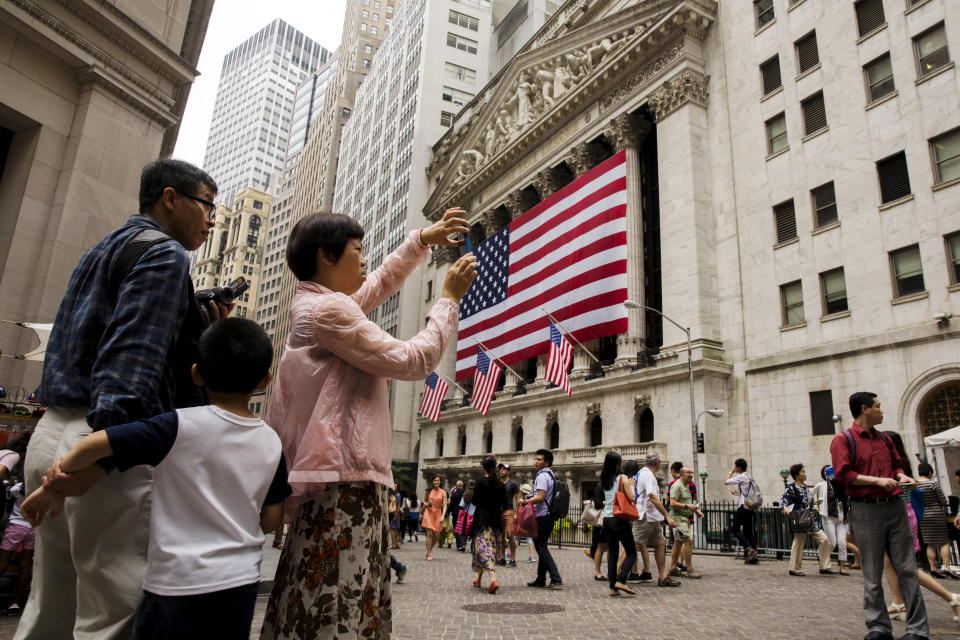US and Chinese consumers are still very optimistic, despite trade tensions
Consumers in the U.S. and China stand to be the biggest losers in the trade war between the two largest economies in the world. But they are not too worried about it, at least for now.
The U.S. and China are still home to the most optimistic consumers in the world, according to the Q2 Global Consumer Confidence Index released by the Conference Board on Wednesday. The U.S. has a consumer confidence index of 121 in the second quarter, while China’s number is 115, both of which are higher than the global average of 107.
This shows the growing tension between Washington and Beijing hasn’t dampened the economic outlook of the countries’ consumers. The Conference Board works with Nelsen to survey consumers about their job prospects, personal finances, and spending intentions.
Part of the optimism comes from the sheer size of the two economies, according to economists. Consumers in large economies consume more domestically and are less dependent on international sources. Trade accounts for about 27% of the GDP in the U.S. and 38% in China, while the world’s average is 58%.
“Most of the tariff increases between the U.S. and China were actually not directly on consumer goods, but they were more on industry goods, intermediate things like that. Now, they didn't automatically translate into large increases in consumer prices because companies quite often were there to meet the cost of that rather than pass it to the consumer, ” said Bart van Ark, chief economist at the Conference Board, explaining why consumers in both nations have not been majorly impacted by the trade war.
Investor sentiment in China isn’t as rosy
Strong consumer confidence is good news to Beijing, which is tasked with shifting its $13.4 trillion economy to a consumption-driven one. Consumer confidence has been holding up well compared to investor confidence. Despite the crash in the domestic stock market, Chinese consumers are relatively optimistic and the optimism has been stable in recent months. It hasn’t come below 110 like it did during the last stock market crash in 2015.
“We'll see that the administration is likely to find various mechanisms to ensure that consumers do not get too nervous about the situation,” Ark said. “China has the opportunity to provide stimulus programs to ask provincial governments to create better conditions for housing and things like that. Just in order to make sure this transition to a more consumer-driven economy doesn't stop.”
This year, the government rolled out a stimulus program including tax cuts and lifted some restrictions on car and real estate purchases. Beijing has set a GDP growth goal of 6%-6.5% this year.
Trade concerns make people cautious

To U.S. consumers, the biggest question is how long the economic expansion could last and if trade issues will trigger the next recession. That concern has been revealed in June’s reading of the U.S. Consumer Confidence Index, which slipped to the lowest level in nearly two years, as the trade talks with China collapsed and tariffs on $300 billion Chinese goods were on the table.
“You can also see people becoming a little bit more cautious,” said Denise Dahlhoff, senior researcher at the Conference Board. In China, a downward trend has persisted for a few quarters when it comes to spending on entertainment and new tech products. Meanwhile, both U.S. and Chinese consumers are cutting back on holiday and vacation spending.
Concerns about future spending and potential price hikes affect whether robust consumer confidence could directly translate into more spending.
“I may be willing to spend but if I do have some concerns about the education of my kids..., or prices that may potentially go up. I may still be cautious and hold off for the time being,” Ark said.
Krystal Hu covers technology and China for Yahoo Finance. Follow her on Twitter.
Read more:

 Yahoo Movies
Yahoo Movies 

